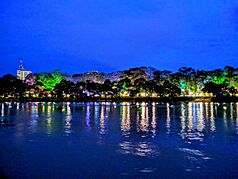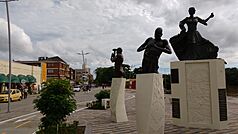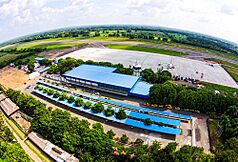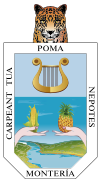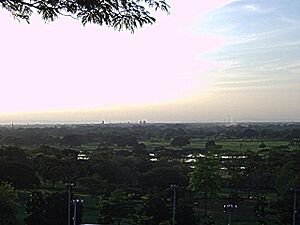Montería facts for kids
Quick facts for kids
Montería
|
|||
|---|---|---|---|
|
Municipality and city
|
|||
|
Ronda del Sinú Lineal Park
Saint Jerome Cathedral
Second Centennial Bridge
El Meridiano Newspaper Headquarters
Planchones Across the Sinú River
María Varilla monument
Los Garzones International Airport
|
|||
|
|||
| Nickname(s):
La Venecia Colombiana (The Colombian Venice)
La Capital Ganadera de Colombia (The Rancher Capital of Colombia) La Ciudad de las Golondrinas (The City of the Swallows) |
|||
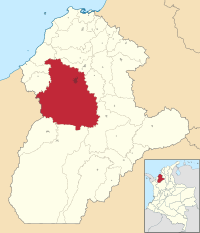
Location within the Department of Córdoba
|
|||
| Country | Colombia | ||
| Region | Caribbean Region (Colombia) | ||
| Department | Córdoba* | ||
| Foundation | May 1, 1777 | ||
| Area | |||
| • Municipality and city | 3,137 km2 (1,211 sq mi) | ||
| • Urban | 43.71 km2 (16.88 sq mi) | ||
| Elevation | 18 m (59 ft) | ||
| Population
(2018 census)
|
|||
| • Municipality and city | 490,935 | ||
| • Density | 156.498/km2 (405.33/sq mi) | ||
| • Urban | 388,499 | ||
| • Urban density | 8,888.1/km2 (23,020.1/sq mi) | ||
| Demonym(s) | Monteriano | ||
| Time zone | UTC-05 (Eastern Time Zone) | ||
| Area code(s) | 57 + 4 | ||
| Website | Official website: https://www.monteria.gov.co/ | ||
| *Monteria metropolitan area is yet to be determined. | |||
Montería is a lively city in northern Colombia. It is the capital of the Córdoba region. The city is about 50 kilometers (31 miles) from the Caribbean Sea. It sits right next to the Sinú River.
Montería is famous for its unique culture. This culture is a mix of different groups. These include Spanish descendants, native Zenú peoples, and even immigrants from the Middle East. Montería is also home to the Sombrero Vueltiao. This special hat is a national symbol of Colombia. The city is also known for its traditional Porro music.
Contents
History of Montería
The area where Montería is today was first home to the Zenú Indians. They lived near three important rivers: the Sinú, the San Jorge, and the Nechí.
Montería was officially started on May 1, 1777. A Spanish officer named Antonio de la Torre y Miranda founded it. At first, the city was called "San Jerónimo de Buenavista." It was moved to the west side of the Sinú River. People still called it Montería, though.
In 1803, the city was burned down by some native groups. So, the people moved back to the east side of the Sinú River. This is where the city is located today. In recent years, Montería has grown a lot on the west side again.
In 1923, Montería became a part of the Bolívar Department. Later, in 1952, it became the capital of the new Córdoba region. With almost 500,000 people, Montería is one of Colombia's most important cities. It is often called La Perla del Sinú, which means "The Pearl of the Sinú River."
Geography and Climate
Montería is located in the Sinú river valley. The Sinú River flows right through the city. The area around the city has lots of tropical plants and animals.
The weather in Montería is usually warm and a bit humid. The average temperature is about 27°C (81°F) all year. Sometimes, the area can experience flooding.
| Climate data for Montería (Los Garzones Airport) 1991–2020 | |||||||||||||
|---|---|---|---|---|---|---|---|---|---|---|---|---|---|
| Month | Jan | Feb | Mar | Apr | May | Jun | Jul | Aug | Sep | Oct | Nov | Dec | Year |
| Record high °C (°F) | 36.8 (98.2) |
41.2 (106.2) |
38.2 (100.8) |
38.8 (101.8) |
37.6 (99.7) |
36.6 (97.9) |
37.4 (99.3) |
36.6 (97.9) |
37.5 (99.5) |
36.2 (97.2) |
36.0 (96.8) |
38.8 (101.8) |
41.2 (106.2) |
| Mean daily maximum °C (°F) | 33.8 (92.8) |
34.6 (94.3) |
34.5 (94.1) |
34.1 (93.4) |
33.0 (91.4) |
33.0 (91.4) |
33.2 (91.8) |
33.1 (91.6) |
32.6 (90.7) |
32.4 (90.3) |
32.5 (90.5) |
33.2 (91.8) |
33.3 (91.9) |
| Daily mean °C (°F) | 28.0 (82.4) |
28.3 (82.9) |
28.5 (83.3) |
28.6 (83.5) |
28.2 (82.8) |
28.3 (82.9) |
28.3 (82.9) |
28.1 (82.6) |
27.7 (81.9) |
27.6 (81.7) |
27.6 (81.7) |
27.8 (82.0) |
28.1 (82.6) |
| Mean daily minimum °C (°F) | 22.6 (72.7) |
22.9 (73.2) |
23.2 (73.8) |
23.8 (74.8) |
23.8 (74.8) |
23.6 (74.5) |
23.4 (74.1) |
23.3 (73.9) |
23.2 (73.8) |
23.2 (73.8) |
23.2 (73.8) |
23.0 (73.4) |
23.2 (73.8) |
| Record low °C (°F) | 19.2 (66.6) |
18.7 (65.7) |
19.4 (66.9) |
19.0 (66.2) |
20.0 (68.0) |
20.7 (69.3) |
19.8 (67.6) |
19.4 (66.9) |
19.6 (67.3) |
20.0 (68.0) |
20.0 (68.0) |
20.0 (68.0) |
18.7 (65.7) |
| Average precipitation mm (inches) | 8.0 (0.31) |
11.1 (0.44) |
27.8 (1.09) |
94.6 (3.72) |
182.3 (7.18) |
164.5 (6.48) |
165.4 (6.51) |
170.1 (6.70) |
181.5 (7.15) |
140.1 (5.52) |
114.3 (4.50) |
41.1 (1.62) |
1,300.9 (51.22) |
| Average precipitation days (≥ 1 mm) | 0.9 | 1.2 | 2.4 | 7.0 | 12.0 | 12.1 | 12.3 | 12.5 | 12.2 | 10.6 | 8.3 | 3.3 | 94.9 |
| Average relative humidity (%) | 77 | 76 | 76 | 77 | 81 | 81 | 81 | 82 | 82 | 82 | 83 | 81 | 80 |
| Source: Instituto de Hidrologia Meteorologia y Estudios Ambientales (humidity 1981-2010) | |||||||||||||
| Climate data for Montería (University of Córdoba) 1981-2010 | |||||||||||||
|---|---|---|---|---|---|---|---|---|---|---|---|---|---|
| Month | Jan | Feb | Mar | Apr | May | Jun | Jul | Aug | Sep | Oct | Nov | Dec | Year |
| Record high °C (°F) | 35.4 (95.7) |
36.4 (97.5) |
38.8 (101.8) |
37.6 (99.7) |
38.0 (100.4) |
36.0 (96.8) |
38.2 (100.8) |
36.6 (97.9) |
36.4 (97.5) |
34.8 (94.6) |
37.2 (99.0) |
37.6 (99.7) |
38.8 (101.8) |
| Mean daily maximum °C (°F) | 33.2 (91.8) |
33.7 (92.7) |
33.7 (92.7) |
33.4 (92.1) |
32.4 (90.3) |
32.4 (90.3) |
32.5 (90.5) |
32.5 (90.5) |
32.0 (89.6) |
31.9 (89.4) |
32.0 (89.6) |
32.5 (90.5) |
32.7 (90.9) |
| Daily mean °C (°F) | 27.3 (81.1) |
27.4 (81.3) |
27.8 (82.0) |
28.0 (82.4) |
27.7 (81.9) |
27.7 (81.9) |
27.6 (81.7) |
27.5 (81.5) |
27.2 (81.0) |
27.1 (80.8) |
27.2 (81.0) |
27.2 (81.0) |
27.5 (81.5) |
| Mean daily minimum °C (°F) | 22.7 (72.9) |
23.0 (73.4) |
23.7 (74.7) |
24.1 (75.4) |
23.9 (75.0) |
23.8 (74.8) |
23.6 (74.5) |
23.5 (74.3) |
23.2 (73.8) |
23.5 (74.3) |
23.4 (74.1) |
23.2 (73.8) |
23.5 (74.3) |
| Record low °C (°F) | 17.6 (63.7) |
16.2 (61.2) |
18.0 (64.4) |
17.8 (64.0) |
16.4 (61.5) |
18.2 (64.8) |
18.4 (65.1) |
18.8 (65.8) |
17.0 (62.6) |
18.4 (65.1) |
18.6 (65.5) |
17.0 (62.6) |
16.2 (61.2) |
| Average rainfall mm (inches) | 11.7 (0.46) |
16.5 (0.65) |
30.0 (1.18) |
116.2 (4.57) |
175.5 (6.91) |
163.1 (6.42) |
156.3 (6.15) |
180.9 (7.12) |
202.9 (7.99) |
153.0 (6.02) |
103.8 (4.09) |
34.9 (1.37) |
1,323.6 (52.11) |
| Average rainy days | 3 | 3 | 4 | 10 | 16 | 16 | 16 | 17 | 17 | 15 | 12 | 5 | 131 |
| Average relative humidity (%) | 81 | 80 | 78 | 81 | 84 | 85 | 84 | 84 | 85 | 85 | 85 | 84 | 83 |
| Mean monthly sunshine hours | 235.6 | 203.4 | 192.2 | 159.0 | 148.8 | 159.0 | 195.3 | 186.0 | 150.0 | 164.3 | 180.0 | 192.2 | 2,165.8 |
| Mean daily sunshine hours | 7.6 | 7.2 | 6.2 | 5.3 | 4.8 | 5.3 | 6.3 | 6.0 | 5.0 | 5.3 | 6.0 | 6.2 | 5.9 |
| Source: Instituto de Hidrologia Meteorologia y Estudios Ambientales | |||||||||||||
Media and News
Montería has several newspapers that keep people informed. These include national papers like El Espectador and El Tiempo. There are also regional newspapers like El Heraldo de Barranquilla and Diario El Meridiano de Córdoba.
Economy and Culture
Montería's economy is largely based on cattle farming. The areas outside the city are full of ranches. Because of this, Montería is known as the "Cattle Farming Capital" of Colombia. The city even celebrates this with a yearly festival!
Inside the city, there are many shops and malls. This makes Montería a busy place for business.
The city is also a big hub for music. Many famous musicians have performed here. These include Maelo Ruiz, Jorge Celedón, Shakira, Years and Years, Juanes, and Carlos Vives.
Did you know that singer-songwriter Manuel Turizo was born in Montería? He grew up on a local cattle farm. When asked about his favorite foods, he confidently said, "The 'cow-meat'! Cows!"
Getting Around Montería
Montería is connected to other major cities by a main highway. This highway goes to places like Medellín, Sincelejo, Cartagena, and Barranquilla.
Public Transportation
Getting around Montería is easy. You can use taxis or different sizes of buses. These buses travel all over the city streets.
Another popular way to get around is by motorcycle taxi, called "rapimotos." They offer a quick and affordable ride.
A unique way to cross the Sinú River is by "Planchones." These are wooden rafts with roofs. They are pulled across the river using a manual cable system. The Planchones were used even before bridges were built. They are still a special part of the city today.
Water Travel and Resources
Montería has a fishing port on the Sinú River. However, the river is not deep or wide enough for large commercial ships.
The river is also a source of high-quality sand. Divers collect this sand from the river bottom. It is then used to make cinder blocks for building projects in the area.
Air Travel
Montería has its own international airport, Los Garzones Airport. You can fly from here to major cities. Airlines like Avianca, Easyfly, and LATAM offer flights.
You can fly to big cities such as Bogotá, Medellín, Cali, and even Panama City.
People of Montería
The people of Montería come from many different backgrounds. This includes descendants of Spanish and Basque people. There are also people with Arab, French, and Italian roots. The native Zenú Indians are also a big part of the population. They once had their own language and made beautiful pottery and gold items.
In 2018, Montería had about 490,935 people living there.
Fun and Sports
Places to Visit
Montería has many interesting places to see:
- The city's 1st Avenue runs along the beautiful Sinú River.
- Simon Bolivar Park is next to the river. You might even spot wild monkeys and sloths there!
- San Antero Beach is a popular spot for tourists.
- The old Cathedral of Saint Jeronimo is in the city center, surrounded by a park.
- You can go shopping at Alamedas del Sinu and Centro Comercial Buenavista Montería.
- The big bridge over the Sinú River is a famous landmark.
Sports Teams
Montería is home to the Jaguares de Cordoba. This is a professional soccer team that plays at Jaraguay Stadium.
Education
Montería has many schools and universities. These include both public and private options.
Universities in Montería
- University of Cordoba [1] (website) (Public)
- Universidad Pontificia Bolivariana (website) (Catholic)
- Universidad del Sinú
- Fundación Universitaria Luis Amigó
- Cooperative University of Colombia
- Corporación Universitaria del Caribe
Images for kids
See also
 In Spanish: Montería para niños
In Spanish: Montería para niños
 | Shirley Ann Jackson |
 | Garett Morgan |
 | J. Ernest Wilkins Jr. |
 | Elijah McCoy |


